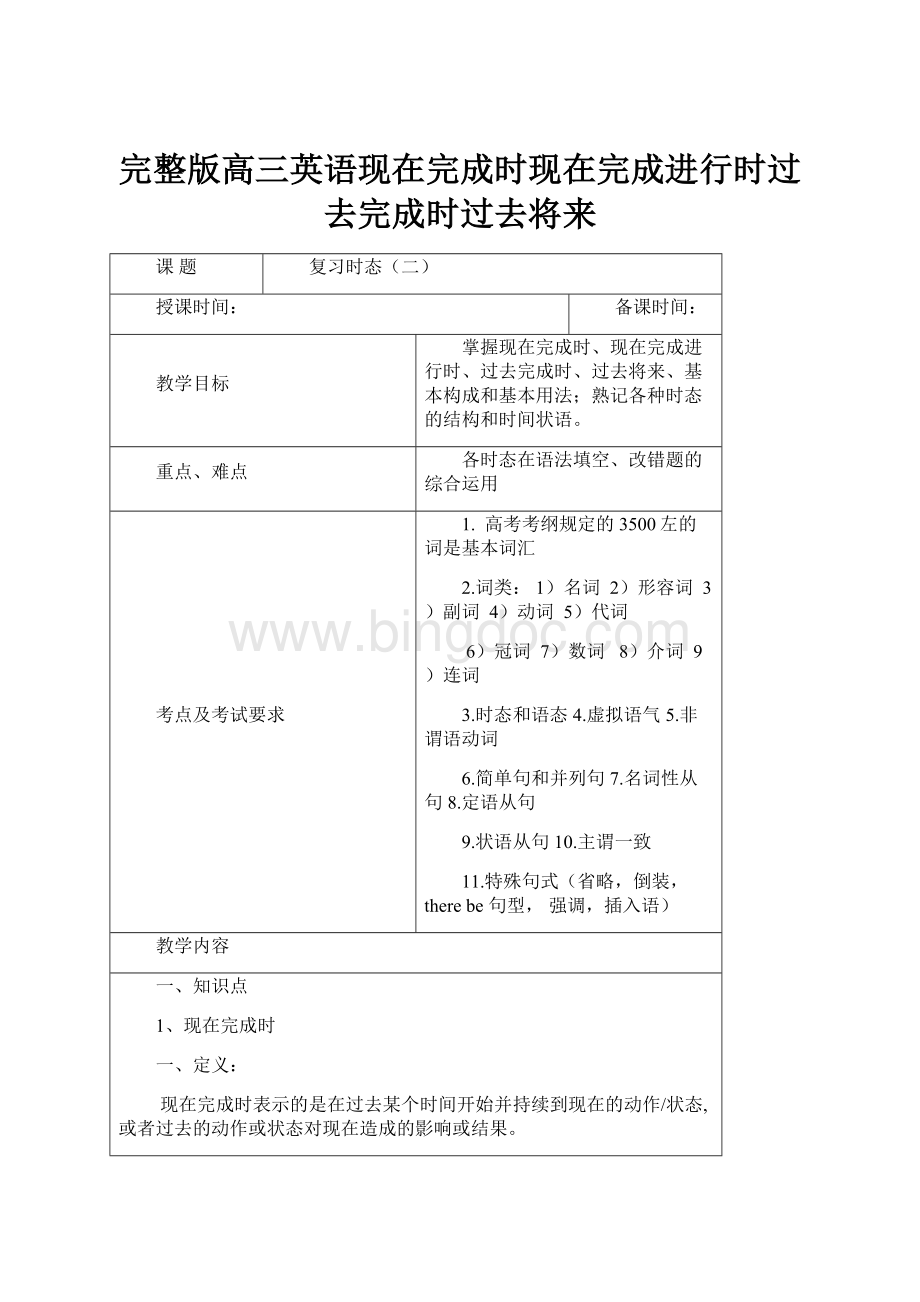完整版高三英语现在完成时现在完成进行时过去完成时过去将来.docx
《完整版高三英语现在完成时现在完成进行时过去完成时过去将来.docx》由会员分享,可在线阅读,更多相关《完整版高三英语现在完成时现在完成进行时过去完成时过去将来.docx(12页珍藏版)》请在冰点文库上搜索。

完整版高三英语现在完成时现在完成进行时过去完成时过去将来
课题
复习时态
(二)
授课时间:
备课时间:
教学目标
掌握现在完成时、现在完成进行时、过去完成时、过去将来、基本构成和基本用法;熟记各种时态的结构和时间状语。
重点、难点
各时态在语法填空、改错题的综合运用
考点及考试要求
1.高考考纲规定的3500左的词是基本词汇
2.词类:
1)名词 2)形容词 3)副词 4)动词 5)代词
6)冠词 7)数词 8)介词 9)连词
3.时态和语态4.虚拟语气5.非谓语动词
6.简单句和并列句7.名词性从句8.定语从句
9.状语从句10.主谓一致
11.特殊句式(省略,倒装,therebe句型,强调,插入语)
教学内容
一、知识点
1、现在完成时
一、定义:
现在完成时表示的是在过去某个时间开始并持续到现在的动作/状态,或者过去的动作或状态对现在造成的影响或结果。
Idon’twanttoseethefilm,becauseIhaveseenitbefore
也可表示持续到现在的动作或状态,或有可能有可能停止,或有可能继续延续下去。
He has learned English since 2001. 从2001年开始学的(,现在还在继续学着呢)
二、.现在完成时的结构
现在完成时的构成形式:
have /has (助动词)+done(过去分词)
I/You/They/We have talked . He/She has talked.
现在完成时的否定结构就是在助动词have或has后加上否定词not;
I/You/They/We haven’t(have not) talked . He/She hasn’t(has not) talked.
其一般疑问句就是将助动词have或has提到句首,
Have I/You/They/We talked . Has he/she talked.
肯定的简略回答是:
Yes,主语+have/has.,否定的简略回答是:
No,主语+have/has not.。
如:
I have seen the film. →Have you seen the film?
Yes, I have./No, I haven’t.
三、现在完成时的标志
1、for+时段②since+过去一个时间点(过去从句)为标志
.for 与since区别:
for +时间段 since+ 时间点
I have lived in Changchun__________ two years.
I have been here__________7 o'clock.
IhavestudiedinthisschoolsinceIcametoChina
用since和for填空
______ two years 2._______ two years ago 3. _______ last month 4.______ 1999
2、already(肯定句),yet(否定,疑问句)
I have already finished my homework. already用在_______,位于_______。
“已经”
Have you finished your homework yet?
yet用在_______和________中,位于_______。
“仍然,已经”
3)so far(目前;迄今为止) up to now=till now=by now到现在为止;直到现在 recently 最近
by the end of…到…末/结束by the end of this year 到今年年末 by the end of this month到本月末
in the last /past months在过去的几个月中 in the past/last few days/years 在过去的这几天
4、用于现在完成时的句型
1)It is the first / second time that+现在完成时。
2)It was the first / second time that+过去完成时
这是我第一次欣赏月光。
_________________________________________________________
3) 用“It is/has been+时间段+since…”句型。
如:
It is/has been three years since I bought the book. (从买这本书起到现在已三年了)
四、跟一段时间连用表示持续动作或状态的动词必须是延续性动词。
例如:
(1)这本书我已经买了三个月了。
错误:
Ihaveboughtthebookforthreemonths.
正确:
(2)你哥哥参军多长时间了?
错误:
Howlonghasyourbrotherjoinedthearmy?
正确:
延续性动词与非延续性动词之间的转换
leave --- be away borrow --- keep buy --- have begin/start --- be on
die --- be dead finish --- be over fall ill --- be ill
get up---be up catch a cold --- have a cold come here --- be here
go there --- be there become --- be come back --- be back
fall asleep --- be asleep get to/ arrive/reach --- be (in) leave --- be away from
get to know --- know go (get) out →be out put on→ wear
join----beamemberof...(成为…的一员)open---beopenclose---beclosed
Theoldmandied4yearsago.----
HejoinedtheParty2yearsago.----
Iboughtthebook5daysago.----
五、现在完成时态与一般过去时态的区别
1一般过去时表示过去某时发生的动作或单纯叙述过去的事情,强调动作;现在完成时为过去发生的,强调过去的事情对现在的影响,强调的是影响。
Isawthefilmyesterday.
Ihaveseenthefilm
2一般过去时和表示过去的时间状语连用,如:
…ago,lastweek/...In2008,inthepast,justnow,thedaybeforeyesterday,yesterday...Then(那时),thatday,oneday,once(从前)
现在完成时常和recently(近来),ever,never,twice,sofar(到目前为止),since,for,inthepast/lastfewyears,already(肯定句),yet(否定,疑问句),just(刚刚),before(以前)连用。
六、比较have/hasbeento、have/hasgoneto和havebeenin
have(has)beento...表示“曾去过某地,已经从那里回来了”,可以和ever、never、twice等连用。
have(has)goneto表示“已经去了某地,在去那里的途中或到达那里还没有回来”。
have(has)beenin表示“在某地呆多长时间”,常与表示一段时间的状语连用,如:
since,for,howlong等
课堂练习:
1. Up to now, the program ________ thousands of children who would otherwise
have died. A. would save B. saves C. had saved D. has saved
2.In the last few years thousands of films _________all over the word.
have produced B. have been produced C. are producing D. are being produce
3 His first novel________good reviews since it came out last month.
A. receives B. is receiving C. will receive D. has received
4.It is the most instructive lecture that I ________ since I came to this school.
A. attended B. had attended C. are attended D. have attended
5. This is the first time we ________ a film in the cinema together as a family.
A. see B. had seen C. saw D. have seen
2、现在完成进行时
一、基本结构:
主语+have/has+beendoing
二、现在完成进行的基本用法
1.现在完成进行时表示现在以前这一段时间里一直在进行的动作,这动作很可能继续进行下去。
如:
IthasbeenrainingsincelastSunday.
He'sbeenwatchingtelevisionallday.
2.现在完成进行时有时表示根据直接或间接的证据得出的结论。
如:
Sheisverytired.She'sbeentypinglettersallday.
Hereyesarered.Shehasbeencrying.
三、现在完成进行时与现在完成时的区别
1.现在完成时可以表示一个已经完成的动作,而现在完成进行时则表示一个正在进行的动作。
如:
Ihavereadthebook.
Ihavebeenreadingthebook.
2.现在完成时通常只陈述事实,而现在完成进行时还可表示一种感情色彩。
如:
Ihavewaitedfortwohours.(陈述事实)
Ihavebeenwaitingfortwohours.(等得好辛苦)
3.不用于进行时态的动词通常也不用于现在完成进行时,但它们可以用于现在完成时。
如:
I'veonlyknownherfortwoday.我认识她刚刚两天。
They'vebeenmarriedfortwentyyears.他们结婚已二十年了。
Thewarhaslastedforalongtime.这场战争持续了很长时间。
练习:
用动词正确形式填空。
1.Youknow,I________(look)forajobforthreemonths,andthisismyfirstformalinterview.
2.Mysister________(stay)inBeijingforthreemonthslastyear.
3.Thelittleboyisdirtyalloverbecausehe________(play)inthemudallthemorning.
4.Hereheis!
We________(wait)anxiouslyforhimsincelastnight.
3、过去完成时
一、基本概念
总体上说它属于“过去”这一时间段内发生的事情,它表达的是在某个过去动作或时间点之前发生的动作,简单地说就是“过去的过去”发生的事情
Ihadfinishedreadingthenovelbynineo'clocklastnight.
二、构成
肯定句:
主语+助动词had +过去分词+其他
否定句 had not ... 例如:
IsaidI hadn't learnt Lesson 20 yet.
疑问句 Had....?
例如:
Had you ever seen such an exciting match before?
Yes, I had. / No, I hadn't.
三、语法判定
1.由时间状语来判定一般说来,各种时态都有特定的时间状语。
与过去完成时连用的时间状语有:
(1)by+过去的时间点。
如:
Ihadfinishedreadingthenovelbynineo'clocklastnight.
(2)bytheendof+过去的时间点。
如:
WehadlearnedovertwothousandEnglishwordsbytheendoflastterm.
(3)before+过去的时间点。
如:
Before 10:
00yesterday, he had finished his homework.
2.由“过去的过去”来判定。
过去完成时表示“过去的过去”,是指过去某一动作之前已经发生或完成的动作,即动作有先后关系,动作在前的用过去完成时,在后的用一般过去时。
She said she had seen the film 4 times.
四、用法
1、表示在过去动作之前已经发生的动作或存在的状态。
例如 :
Most of the guest had left when he arrived at the party. (即:
客人在他到之前已经离开了。
)
They had already had breakfast before they arrived at the hotel.(即:
吃饭在先,他们到达在后。
)
1、过去完成时还可以表示从过去某一时间开始,持续到过去另一时间的动作或状态。
例如 :
He had worked in the factory for five years before he moved here .
By the time I got there, it had already finished.
Ann had lived in a cottage for sixty years ever since she was born.
3、叙述过去发生的事情,在已叙述了过去发生的事情后,反过来追述或补述以前发生的动作时,常使用过去完成时。
例如:
Mr.Smithdiedyesterday.Hehadbeenagoodfriendofmine.
4、过去完成时常常用在told,said,knew,heard,thought等动词后的宾语从句(或间接引语)中,这时从句中的动作发生在主句表示的过去的动作之前。
例如:
Hesaidthathehadknownherwell.他说他很熟悉她。
5、状语从句:
在过去不同时间发生的两个动作中,发生在前,用过去完成时;发生在后,用一般过去时。
如:
when,before,after,assoonas,till/until引导的
例如:
________________________________________________________.我醒来时雨已停了。
6、在含有定语从句的主从复合句中,如果叙述的是过去的事,先发生的动作常用过去完成时。
例如:
IreturnedthebookthatIhadborrowed.我已归还了我借的书。
五、其它句型
1. It was the first time that 从句中,从句用过去完成时。
It was the first time that he had seen so beautiful scenery。
2、.Hardly/scarcely....when 与no sooner than 引导的时间状语从句中,从句是一般过去时时,
主句就用过去完成时。
e.g:
Hehadhardly begun to speak when the audience interrupted him.
He had no soonerarrived than he went away again. 他刚到就又走了。
注:
hardly/ scarcely/ no sooner 放在句首时,句子要使用部分倒装。
No sooner had I reached home than it began to rain
六、过去完成时与现在完成时的区别
现在完成时表示的动作发生在过去,以现在的时间为基点,但侧重对现在产生的结果或造成的影响,与现在有关
过去完成时则是一个相对的时态,以过去时间为基点,它所表示的动作不仅发生在过去,更强调“过去的过去”,只有和过去某时或某动作相比较时,才用到它。
比较:
I___________________(learn)1000Englishwordssofar.
I________________(learn)1000Englishwordstillthen.
七、过去完成时与一般过去时的区别
虽然这两种时态都表示过去发生的动作或存在的状态,但在使用时应注意以下几点:
1.时间状语不同:
过去完成时在时间上强调“过去的过去”;而一般过去时只强调过去某一特定的时间。
比较:
Theyhadarrivedatthestationbytenyesterday.
Theyarrivedatthestationattenyesterday.
练习:
. 单项选择
1.He asked me ____ during the summer holidays.
A. where I had been B. where I had gone C. where had I been D. where had I gone
2. What___ Jane ____ by the time he was sever?
A. did, do B. has, done C did, did. D. had, done
3. I ______ 900 English words by the time I was ten。
A. learned B. was learning C. had learned D. learnt
4. She _____lived here for ______ years.
A. had, a few B. has, several C. had, a lot of D. has, a great deal of
5. By the time my parents reached home yesterday, I ___ the dinner already.
A had cooked B. cooked C. have cooked D. was cooked
4、过去将来时
一、过去将来时的构成:
1、would/should+动词原形
2、was/weregoingto+动词原形
二、过去将来时的用法:
1、表示从过去某时看将要发生的动作或存在的状态。
常用于主句是一般过去时的宾语从句中。
例如:
Hesaidthathewouldfinishhisworkbefore9o’clocktomorrow.
2、表示过去的某种习惯,只要would。
例如:
Wheneverhehasbeenintrouble,wewouldgivehimahand.每当他遇到困难时,我们总会伸出援助之手。
巩固练习:
1. Li Ming said he _____happy if Brian_____to China next month.
A. as; come B. was; would come C. would be; came D. will be; come
2. —What did your son say in the letter?
—He told me that he ______ the Disney World the next day.
A. will visit B. has visited C. is going to visit D. would visit
2、课堂练习
1、单句语法填空
1.While making great efforts to run away, she ________ (fall) over the hill and died.
2.In order to get good marks in the coming exam, my son ________ (study) late every night in the past
thre